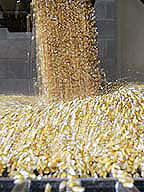
Concerns of high oil prices and global warming are making
people think of alternatives for high-priced fossil fuels, and more eager to
embrace new technologies to solve the energy crisis.
Biofuels, e.g. ethanol produced from corn, sound like a good alternative. Corn
can be grown in many places, not just to be found in oil rich countries. It
seems like a cheap, abundant and clean alternative. However, before adopting
biofuels as a large scale alternative to fossil fuel, we should be aware of
other implications. Otherwise, in an effort to solve one problem, we can be
hastening ourselves into new problems.
The production of crops for fuel takes up land, uses water and fertilizer, which
are very much in demand for food production. While humanity is still struggling
to eliminate hunger, to grow crops for fuel in a large scale may lead to
widespread food shortages. When food production and energy production are in
competition for resources, can the market forces be trusted to decide if the
crop will be produced to fuel SUVs or to feed hungry people?
Furthermore, the monoculture in energy farming is an enemy to biodiversity, as
natural habitats are destroyed to clear land, and the survival of diverse
species will be threatened. Perhaps the potential cost of biofuel is higher than
we think.
Yet politicians in Canada and the U.S are pushing for the widespread adoption of
biofuels by providing funding and incentives. Just like the initial warnings of
global warming, scientists have alerted decision makers to the pitfalls of
biofuels, but with little success.
Humanity is facing more than the energy crisis. Perhaps the real alternative is
not in having more energy sources, but in simplifying our living. If we develop
our human qualities and relationships, perhaps we will find that fulfillment
comes from somewhere else, rather than from the ever growing appetite of
consumption and material possession with all the energy that is needed to
produce them.